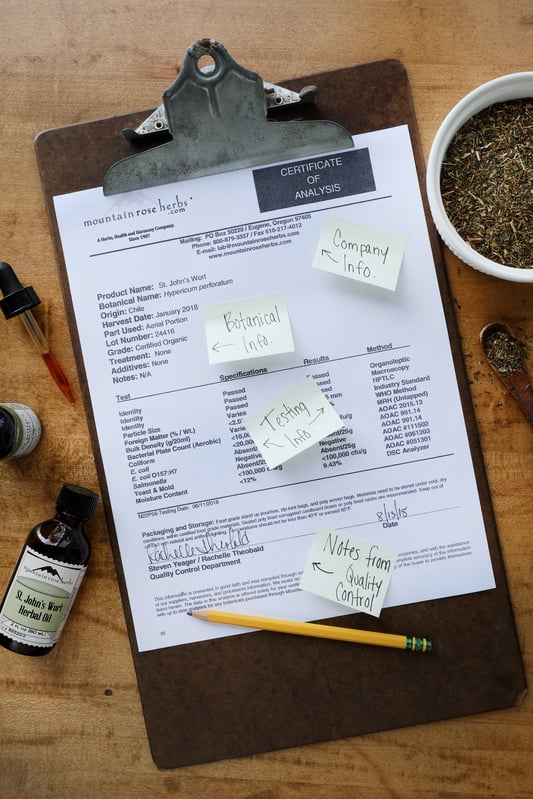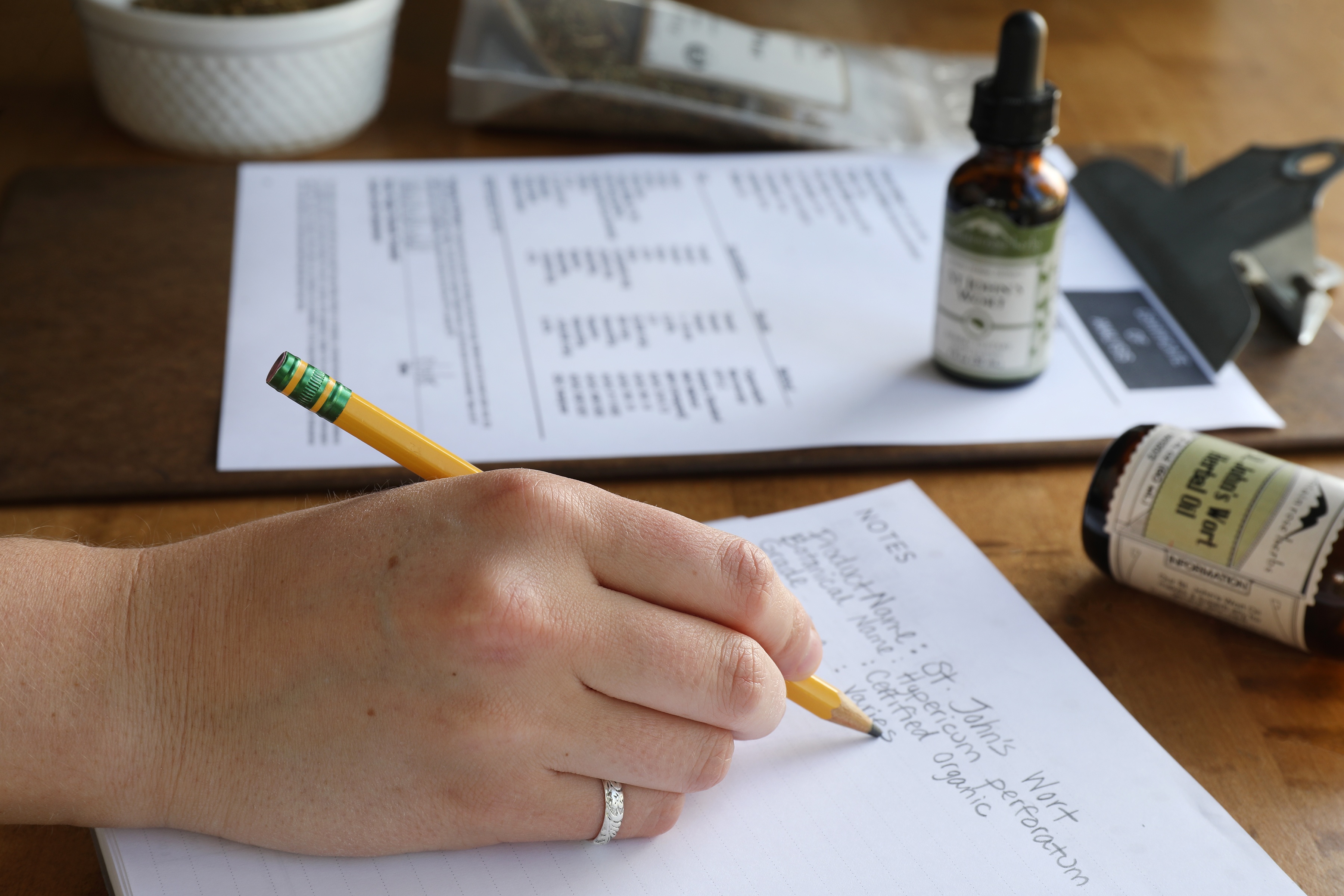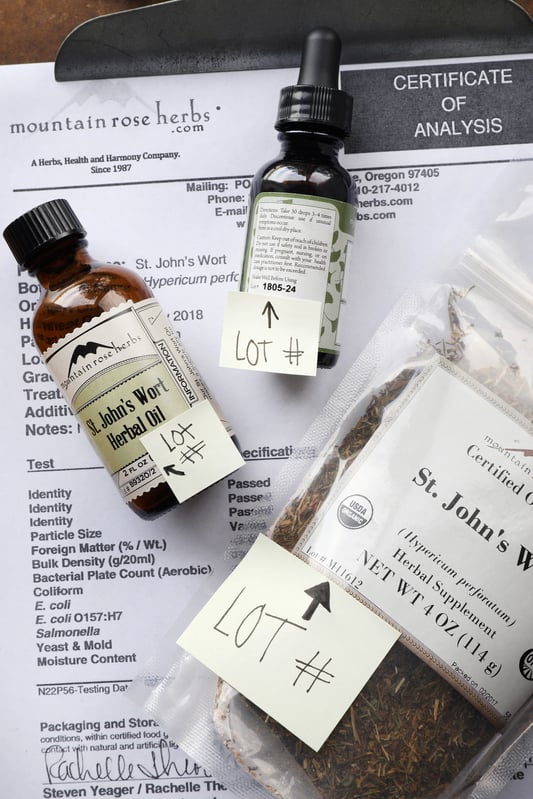A Certificate of Analysis for organic St. John's Wort.
Many of our wonderful customers have questions about the botanicals we sell, either because of health concerns, curiosity, or personal business reasons. Whatever the question may be, we like to provide our community with assurance that we are selling products that are safe, unadulterated, and exactly as listed on our website. One of the ways we do this is through making a document called a “Certificate of Analysis” (COA), which is available to all of our customers upon request.
What is a Certificate of Analysis (COA)?
A Certificate of Analysis is a document from our quality control department which provides details regarding the testing that ensures the identity and safety of a botanical that we sell. The document shows which specifications (kind of like quality requirements) the botanical must meet in order to be sold.
Why do we do this? All companies are required by the FDA to perform a risk assessment on any botanical sold, set specifications, and ensure that the products being sold meet those specifications. However, not all companies will share this documentation with their customers. We believe that an important part of offering quality botanicals is transparency. It’s important to us that you feel good about the herbs and spices you are using on or in your body, which is why you can request a Certificate of Analysis as well as other quality control documents from our quality control team on any botanical you purchase from Mountain Rose Herbs.
How to Request a Certificate of Analysis
If you’d like to receive a Certificate of Analysis about a botanical, all you need to do is contact our support team (support@mountainroseherbs.com) and ask! If you are requesting a COA about a product you have already purchased, be sure to let us know the lot number your product. You can find the lot number printed on your product’s packaging. For our bulk herbs, spices, and seasonings, you can find the lot number printed in the bottom left-hand corner of the label.
If you’d like to request a Certificate of Analysis or other documents when you make your next purchase, just let us know in the Special Instructions field during the checkout process.
Reading Your COA from Top to Bottom
Company Info
At the very top of a Certificate of Analysis, on the left-hand side, you'll find the Mountain Rose Herbs logo, which tells you that the document came from our lab. On the upper right-hand side is a black box with text that says “Certificate of Analysis”. This confirms that the document you are looking at is indeed a Certificate of Analysis. Just below these sections, you’ll see our quality control department’s contact information.
Botanical Info
Underneath the company information is a section that will tell you about the botanical of interest. At the beginning of this section, you’ll find the name botanical name, followed by helpful info about where it was sourced, when it was harvested, which part of the botanical was tested, its lot number, and any other relevant notes.
Testing info
In the middle/bottom half of the document is a table with four columns. The far left-hand column outlines all of the tests that have been performed on the botanical. The rows will give you information about each test performed and its results.
- Column 1: Test (What kind of quality assurance tests were performed on the botanical?)
- Column 2: Specifications (What kind of requirements must the test results show in order for the botanical to be sold?)
- Column 3: Results (What were the results of the tests performed?)
- Column 4: Method (How was the test performed? The method must be scientifically fit for the purpose or, in other words, considered appropriate by the scientific community.)
Here’s the most important part of this document: If, when tested, a botanical doesn’t meet its specifications, we will not sell it to our customers.
A few other helpful notes:
- Under the bottom left-hand corner of the table: The six digit code indicates the page number in our lab notebook where the tests were first recorded (e.g., for the COA shown in photos above, "N20P88" means notebook #20 and page 88.) The testing date is when we started the testing process.
- Under the bottom right-hand corner of the table: A single asterisk (*) or double asterisk (**) indicates that the test was completed by an accredited lab outside of Mountain Rose Herbs.
Notes from Quality Control
At the very bottom of the Certificate of Analysis are notes from our quality control department.
- Packaging & storage: This paragraph lists our recommendations for packaging and storing the botanical of interest.
- The signature and date indicate the approval and completion of the COA. Because our quality control folks are busy bees, it’s possible that the COA document was not typed up and printed until days or weeks after the actual tests were conducted. The date next to the signature indicates when the COA was typed out, completed, and reviewed by a final Quality Control Officer.
Note: Even though the COA only shows a signature from one person, the test results for the botanical have usually been reviewed by three or four different members of the quality control department. Only after the quality team has performed a series of sign-offs will the botanical be approved for sale.
Frequently Used Terms
Our expert quality control department will test for anything that's a particular risk concern for a given botanical, so there may be unfamiliar terms on the Certificate of Analysis beyond what’s on this list. Our website has lots more helpful information, but you can always contact us directly with questions! Here are some common terms to get you started.
- “Harvest Date” is when the botanical was originally harvested from the farm on which it was grown. A gap between the harvest date and the testing date is often due to shipping times or necessary drying or processing time for the botanical.
- “Additives”: It’s very very rare that any of our products contain additives. If they do, then the percentage and name of the additive will be listed here. An example of an additive would be silicon dioxide, which is occasionally added to garlic powder and onion powder in order to prevent “caking.”
- The “Lot Number” is a unique identifier for the purpose of traceability, making it one of the most important pieces of information you can have about your botanical. The “lot number” helps our quality team know where and when the botanical was harvested, when it was shipped, at which Mountain Rose Herbs facility it arrived, and so on. Because the lot number also goes on each package sold to customers, we know exactly where the lot of herbs has gone and how much we have left.
- “Extraneous matter” is a test to ensure that there is no additional material in the lot. Because our herbs and spices often come straight from the farm, it’s possible that a few other leaves or pieces of hay may have made their way into the lot. A result of 0.05% means that we found no extraneous matter at all!
- The “moisture content” test ensures that the botanical is below a certain moisture level. Even though the herbs and spices we sell are all dried, they may still contain a very, very small amount of moisture. With a few exceptions, the specification for this test is 12%, because when a dried botanical has a moisture level higher than 12%, there’s a higher potential for mold to grow.
- “Identity testing” is when we test for the genus, species, and correct plant part. This is a process through which we verify that the botanical we are about to sell is truly the botanical that our customers are expecting. We always perform at least one identity test on a botanical, and we frequently do multiple identity tests, each using different methods (such as organoleptic, microscopy, HPTLC, and DNA testing).
- “Bulk density” means weight per 20 ml of volume. We don’t have a specification for this test, but we do measure the bulk density for the sake of our customers. Some of our customers (particularly those who make and sell their own herbal products) may want a particular density for their recipes.
- “Particle size”: Some folks who buy from us are particular about the particle size of the herb they’re buying, so having this information available makes their buying process easier.
- Tests for "bacterial plate count (aerobic)," "Coliform," “E. coli,”“Salmonella,” and "yeast & mold" are microbial tests. Because there are various microbial contaminants which may be health concerns, all botanicals get microbial testing.
You may also run into these terms:
- ppm stands for “parts per million”
- cfu/g stands for “colony-forming unit per gram”
- “absent” results indicate that the botanical does not contain the bacteria it was tested for
Questions? We can help!
Do you have questions about what you see on your Certificate of Analysis? You can contact support@mountainroseherbs.com or qc@mountainroseherbs.com with any questions about the COA you requested. Notes on each COA can vary, depending on the botanical, which supplier it came from, and where it was sourced. We encourage you to reach out to our quality control team about any specific questions you may have!
Curious about What goes on in our lab?
Read Our Q&A with Quality Control
You may also like:
- Organic vs. Non-GMO: What's The Difference?
- Why We Go Out of Stock
- Why Our Pacific Northwest Farms Grow Organic













